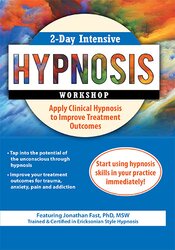

Watch this Intensive Workshop and transform your practice to heal anxiety, stress, trauma, sleep, addiction, and pain.
Leave this high-impact workshop and immediately apply the following hypnosis skills in your practice:
The unconscious is a reservoir of potential, and hypnosis is the way to access that potential. By working indirectly and unconsciously in hypnosis, you bypass your client’s conscious limitations and enlist resources to help resolve entrenched problems. You can also utilize powerful self-hypnosis techniques for self-transformation and self-care.
If you are new to hypnosis, you will gain the skills you need to start using hypnosis in your practice. And if you are an experienced hypnotherapist, you will add innovative methods to enhance your work.
With the latest research, case examples, guided trance experiences, opportunities to work with trance induction, helpful handouts, and protocols – this workshop will inform, uplift, and transform!
| File type | File name | Number of pages | |
|---|---|---|---|
| Manual - 2-Day Intensive Hypnosis Workshop: Apply Clinical Hypnosis to Improve Treatment Outcomes (10.5 MB) | 91 Pages | Available after Purchase | |
| Neuroscience of Hypnosis - Additional Handout (0.05 MB) | 2 Pages | Available after Purchase | |
| Diagram - Additional Handout (0.03 MB) | 1 Pages | Available after Purchase |
Jonathan Fast, PhD, MSW, is trained and certified in Ericksonian hypnosis. Dr. Fast has lectured and delivered keynotes at many conferences, and appeared on most of the major news outlets. He has been interviewed on several occasions by the BBC World News. He is the author of 12 books and numerous scholarly articles and book chapters. He is a member of the American Society for Clinical Hypnosis (ASCH).
Hypnosis is an integral part of his clinical practice. Over the years he has used it in a variety of settings with clients of all ages. Dr. Fast has been fascinated by hypnosis since he was a child.
He earned a Masters of Social Work from Columbia University, and a PhD from Yeshiva University, including post-doctoral training at NYSEPH (New York Society for Ericksonian Psychotherapy and Hypnosis). For nearly 20 years, Dr. Fast was a professor of Social Work Research & Practice at Wurzweiler School of Social Work in New York City.
Speaker Disclosures:
Financial: Jonathan Fast is a tenured associate professor at Yeshiva University. He receives a speaking honorarium from PESI, Inc. He has no relevant financial relationships with ineligible organizations.
Non-financial: Jonathan Fast is a member of the National Association of Social Workers.
Please wait ...